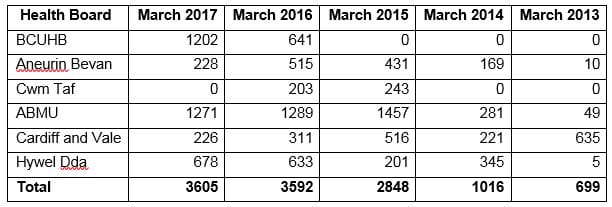Wales sees over 400% increase in patients waiting more than a year for surgery – RCS analysis
30 August 2017
Freedom of Information requests of waiting times data in Wales made by the Royal College of Surgeons (RCS) have found that in March 2017 the number of patients waiting more than a year (52 weeks) for surgical treatment was 3,605 – a rise of over 400% in four years. In March 2013, 699 patients were waiting more than a year for treatment.
The Royal College of Surgeons has warned that NHS Wales and the Welsh Government must give renewed focus to developing a strategy that significantly reduces long waiting times. NHS Wales has made progress decreasing 26 week and 36 week waits for surgical treatment in recent years.
Betsi Cadwaladr University Health Board (BCUHB) and Abertawe Bro Morgannwg University Health Board (ABMU) have seen the greatest increases in patients having to wait longer than 52 weeks to receive treatment. Conversely, no patients served by Cwm Taf University Health Board waited more than 52 weeks for treatment in March 2017.
Number of patients waiting more than 52 weeks for surgical treatment by Health Board:
There has also been a particularly steep in increase in the number of patients waiting for particular types of surgery. Trauma and Orthopaedics, has seen an increase from 39 patients waiting more than 52 weeks in March 2013, to 2,489 patients in March 2017. Other surgical specialties with significant increases in 52-week waits include:
• General surgery – from 184 in March 2013, to 376 in March 2017
• Maxillo facial surgery – from 91 in March 2013, to 213 in March 2017
• Urology – from 84 in March 2013, to 144 in March 2017
The number of patients in Wales waiting more than 52 weeks for surgical treatment (3,605) is particularly high when compared to England where 1,302 patients waited longer than a year for treatment in March 2017.
Commenting on the increase in long waits, Mr Tim Havard, Regional Director for Wales at the Royal College of Surgeons and a consultant general surgeon said:
“Thanks to the hard work of NHS staff, waiting times longer than 36 weeks have started to come down over the last couple of years but overall waits are still too long and the very steep increase in the number of patients waiting longer than a year for treatment is very worrying.
“NHS Wales and the Government must give renewed focus to policies that will help decrease waiting times. In particular, we’d like to see better provision of out-of-hospital services and more protection of beds used for planned surgery.
“Long waits for surgery can be traumatising for patients and their families. In some cases patients will be in extreme pain or immobile, possibly unable to work or carry out daily tasks. A patient’s condition can also deteriorate the longer they are made to wait for treatment, meaning the eventual outcomes are not as good as they could have been.
“The Welsh health service is facing a raft of pressures, with hospital wards being filled with patients that should be treated in the community and a continued squeeze on finances.
Improving the availability of community beds, primary care, and caring for people in their own home would significantly reduce unnecessary and prolonged hospital admissions.
“The ongoing parliamentary review of health and social care in Wales offer an opportunity to confront some of the problems causing long waits for treatments and give patients the timely access to care they require.”
Notes to editors
The Royal College of Surgeons of England is a professional membership organisation and registered charity, which exists to advance surgical standards and improve patient care.
For more information, please contact the Press Office:
- Telephone: 020 7869 6047/6052
- Email: pressoffice@rcseng.ac.uk
- Out of hours media enquiries: 07966 486832

